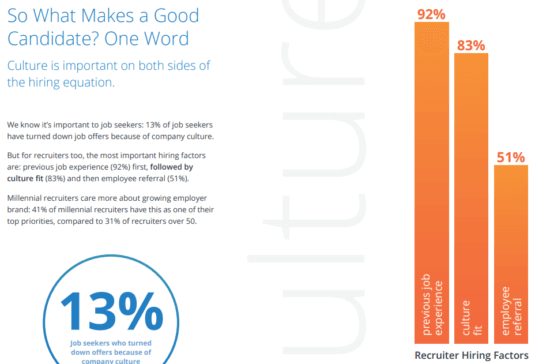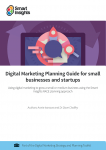Pointers for the perfect marketing résumé in 2019
As a marketing expert, your job description includes selling products and services. Then writing a marketing résumé should be easy for you! You just have to sell yourself, right? It’s ironic, but many job applicants in this industry struggle with the completion of the perfect marketing résumé. Some of them even neglect its importance; they just follow a random format and replace the crucial information with their own details.
It’s time for us to understand how crucial the résumé is during the application process. Yes; the employer will mostly care about your experience, and they will evaluate your skills through the portfolio. The resume, however, is the first document they are going to see. If it doesn’t get their attention, why should they bother checking your portfolio at all?
If you were wondering how important the résumé is, the 2017 Jobvite Recruiter Nation Report gives us few details that answer that question. These are the most important hiring factors for recruiters:
- Previous job experience (92%)
- Culture fit (83%)
- Employee referral (51%)

But how does an employer know that they like your experience, where do they see the referrals, and how do they assume you’re a good culture fit?
The résumé tells them that!
Of course, they will evaluate all these aspects during the interview, but the résumé is what gets you to that interview.
So what do employers want to see in your résumé?
When evaluating candidates for a position related to marketing, the employers are focused on these main aspects:
- Qualifications – Do you meet the requirements for this particular position?
- Readability/Scannability – Can a hiring manager go through your résumé in two minutes?
- Format – You can’t write a personal essay and call it a résumé. This job application document needs a specific format that meets the standardized requirements.
- Writing skills – Communication skills are an important aspect of your qualifications for this job. The way you write reflects your communication skills. That’s why your style and literacy are just as important as your experience and skills.
- The ability to sell yourself – That’s how they evaluate your ability to sell anything. They are not looking for bragging; they want you to expose your accomplishments, responsibilities, and talents without turning the resume into an ego trip.
What does the perfect marketing résumé look like?
All above-mentioned hints already give you a basic idea for the perfect résumé. But you need practical examples to understand exactly what employers are looking for, right?
No problem! We’ll discuss the anatomy of the perfect résumé that could land you a job in marketing in 2019.
- The perfect marketing résumé is rather simple.
Glassdoor is a consistent and authoritative provider of tips for job applicants. If you have a question for the résumé, interview, or any other aspect of the process, you’ll probably find guidance at their website.
The Glassdoor experts recommend pretty simple résumé anatomy for 2019. Check it out:

What are the main things we notice about this résumé?
- The design is super simple, but effective. We see some color to highlight the candidate’s name, so the hiring manager can easily remember it. The sections are clearly outlined and all major details are visible from a single skim.
- The focus is on skills and work experience. That’s how marketing résumés should be done! You’ll notice that this résumé doesn’t feature an excessive list of skills. If you think about it, you could add at least five others as soft skills, including adaptability, ability to work under pressure, time management, self-motivation, decision making, and so on. But those are just buzzwords. In this résumé, the candidate listed only relevant skills and he listed work experience that corresponds with them.
So when you list your key skills, make sure to explain exactly how you’re good at them through the description of your prior work experience.
- Quantification is a must!
In the résumé format recommended by Glassdoor, we see numbers. They show us that the candidate is not just rambling stuff he saw in a résumé sample. He provides proof:
- “Analyzed data from Google Analytics and Marketo to optimize marketing efforts moving forward, leading to a 24% increase in downloads from campaign 2 to campaign 3.”
- “Consistently up-sold offerings and daily specials, resulting in an average yearly revenue increase of 12%.”
- “Collaborated with a team of 4 people to brainstorm 3 major creative campaigns which ultimately drove 100,000+ website visits and a 27% yearly increase in traffic.”
These numbers add credibility to the statements. They make them look real. Needless to say, you can’t make these things up. Any serious employer will contact your previous employers to check and verify the facts.
- You gotta lose the ego!
Do we see that marketing résumé as bragging? Absolutely not! Yes; the candidate offers details that show how good he is. But these are just facts. He doesn’t say things like “I’m the absolute best candidate you could possibly hire.” He provides evidence that could lead the employer to such a conclusion.
How is this effect achieved? Through style. You won’t see I in the content. The candidate eliminates pronouns from the expression. That kind of style doesn’t work in daily communication, but it’s perfect for a résumé. It removes the ego and allows the candidate to focus on facts.
- It’s a chronological résumé
In format, this is a chronological marketing résumé. It puts the work history in focus, listing it in reverse chronological order. That means the latest employment is listed first. This format works because it allows the employer to see your career progress.
The chronological format is perfect for this particular candidate since he doesn’t have a gap in between the jobs. He left one in December 2016 and started a new job right away.
If you have enough experience to list, then this is the format you should choose. If not, you can opt for the functional format, which puts the focus on your skills and strengths.
You have to craft the résumé that’s perfect for you
The requirements from employers regarding résumés are pretty standard. They want clarity and relevance. The resume we discussed as an example meets those requirements. Still, that doesn’t mean you should take it literally. You can use it as guidance, but make sure to infuse your own personality.
